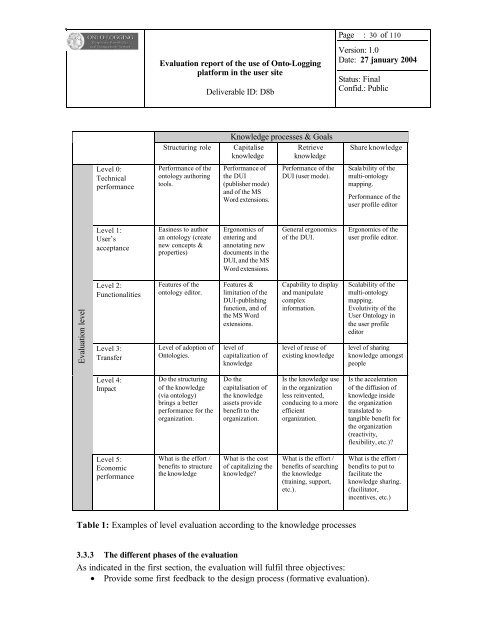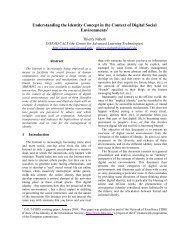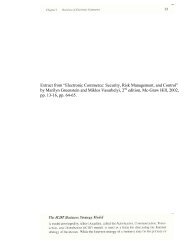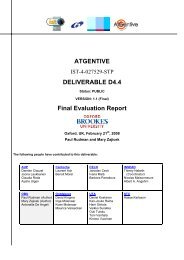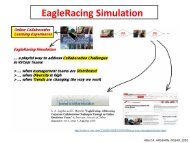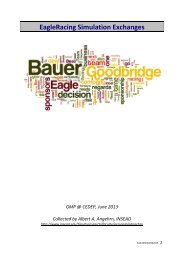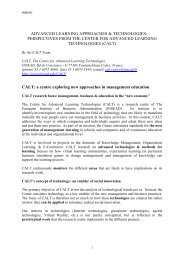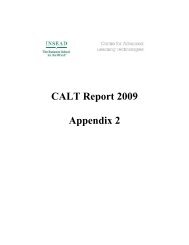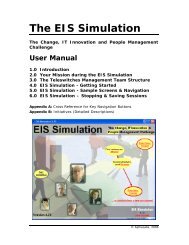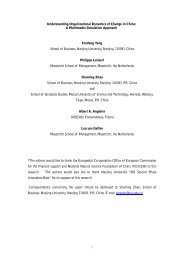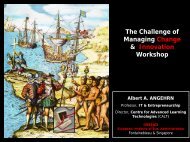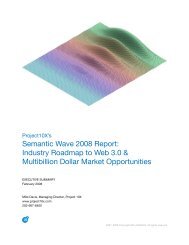pdf 820Kb - INSEAD CALT
pdf 820Kb - INSEAD CALT
pdf 820Kb - INSEAD CALT
You also want an ePaper? Increase the reach of your titles
YUMPU automatically turns print PDFs into web optimized ePapers that Google loves.
Evaluation level<br />
Level 0:<br />
Technical<br />
performance<br />
Level 1:<br />
User’s<br />
acceptance<br />
Level 2:<br />
Functionalities<br />
Level 3:<br />
Transfer<br />
Level 4:<br />
Impact<br />
Level 5:<br />
Economic<br />
performance<br />
Evaluation report of the use of Onto-Logging<br />
platform in the user site<br />
Structuring role<br />
Performance of the<br />
ontology authoring<br />
tools.<br />
Easiness to author<br />
an ontology (create<br />
new concepts &<br />
properties)<br />
Features of the<br />
ontology editor.<br />
Level of adoption of<br />
Ontologies.<br />
Do the structuring<br />
of the knowledge<br />
(via ontology)<br />
brings a better<br />
performance for the<br />
organization.<br />
What is the effort /<br />
benefits to structure<br />
the knowledge<br />
Deliverable ID: D8b<br />
Knowledge processes & Goals<br />
Capitalise<br />
knowledge<br />
Performance of<br />
the DUI<br />
(publisher mode)<br />
and of the MS<br />
Word extensions.<br />
Ergonomics of<br />
entering and<br />
annotating new<br />
documents in the<br />
DUI, and the MS<br />
Word extensions.<br />
Features &<br />
limitation of the<br />
DUI-publishing<br />
function, and of<br />
the MS Word<br />
extensions.<br />
level of<br />
capitalization of<br />
knowledge<br />
Do the<br />
capitalisation of<br />
the knowledge<br />
assets provide<br />
benefit to the<br />
organization.<br />
What is the cost<br />
of capitalizing the<br />
knowledge?<br />
Retrieve<br />
knowledge<br />
Performance of the<br />
DUI (user mode).<br />
General ergonomics<br />
of the DUI.<br />
Capability to display<br />
and manipulate<br />
complex<br />
information.<br />
level of reuse of<br />
existing knowledge<br />
Is the knowledge use<br />
in the organization<br />
less reinvented,<br />
conducing to a more<br />
efficient<br />
organization.<br />
What is the effort /<br />
benefits of searching<br />
the knowledge<br />
(training, support,<br />
etc.).<br />
Table 1: Examples of level evaluation according to the knowledge processes<br />
Page : 30 of 110<br />
Version: 1.0<br />
Date: 27 january 2004<br />
Status: Final<br />
Confid.: Public<br />
Share knowledge<br />
Scala bility of the<br />
multi-ontology<br />
mapping.<br />
3.3.3 The different phases of the evaluation<br />
As indicated in the first section, the evaluation will fulfil three objectives:<br />
• Provide some first feedback to the design process (formative evaluation).<br />
Performance of the<br />
user profile editor<br />
Ergonomics of the<br />
user profile editor.<br />
Scalability of the<br />
multi-ontology<br />
mapping.<br />
Evolutivity of the<br />
User Ontology in<br />
the user profile<br />
editor<br />
level of sharing<br />
knowledge amongst<br />
people<br />
Is the acceleration<br />
of the diffusion of<br />
knowledge inside<br />
the organization<br />
translated to<br />
tangible benefit for<br />
the organization<br />
(reactivity,<br />
flexibility, etc.)?<br />
What is the effort /<br />
benefits to put to<br />
facilitate the<br />
knowledge sharing.<br />
(facilitator,<br />
incentives, etc.)


